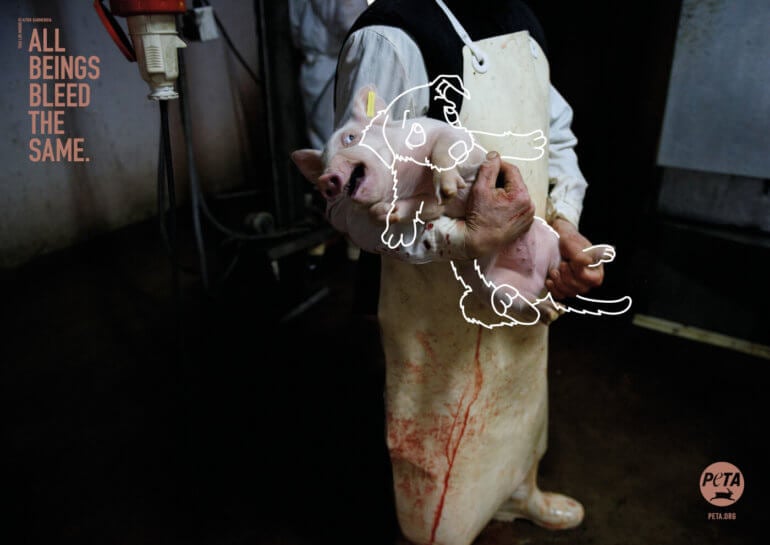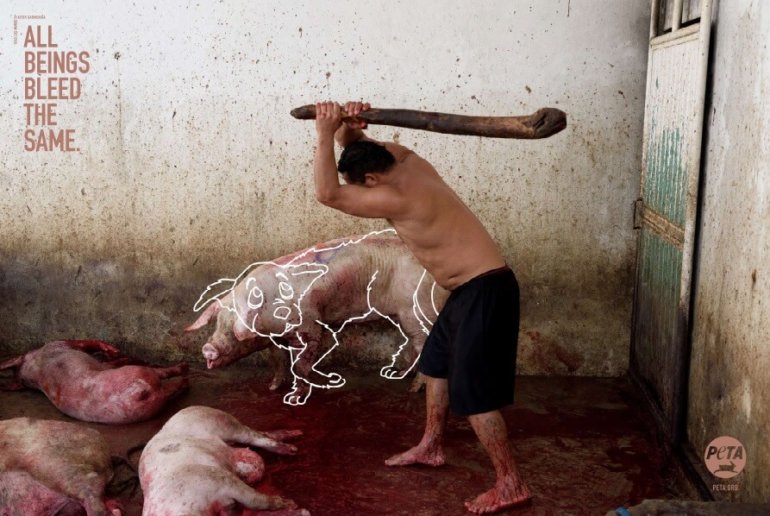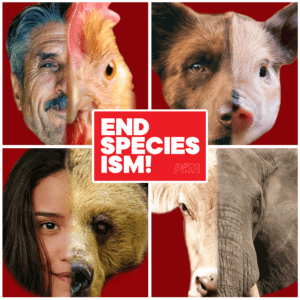Bigotry begins when categories such as race, age, gender, sex, sexual orientation, or species are used to justify discrimination.
Speciesism: Prejudice or discrimination based on species
Speciesism – like sexism, racism, and other forms of discrimination – is an oppressive belief system in which those with power draw boundaries to justify using or excluding their fellow beings who are less powerful. A human-supremacist line of “reasoning” is used to defend treating other living, feeling beings like research tools, fabric, toys, or even food ingredients – even though they share our capacity for pain, hunger, fear, thirst, love, joy, and loneliness and have as much interest in freedom and staying alive as humans do.

Other animals are not objects that belong to us – they’re individuals with their own interests, just like us. Addressing speciesism and acknowledging other animals’ rights can be as simple as respecting their needs or leaving them in peace.
Many humans grow up thinking of themselves as entirely different from and superior to other animals, which lays the foundation for exploiting them.
From childhood, most humans are conditioned to view certain species as worthy of care and compassion and others as less important or unworthy – based on arbitrary human preferences. This toxic view also leads humans to draw groundless distinctions between animal species based on the worth of those animals to them. Consider the following examples:
-
- Animals are often referred to as property. Many humans call themselves an animal’s “owner” and refer to the animal as “it”, as if he or she were an inanimate object like a table or a chair.
-
- Most humans wouldn’t dream of keeping their dog in a cramped, crowded warehouse on a slab of filthy concrete, which is the way pigs are treated in the food industry – even though pigs are able to experience the same pain, joy, fear, and misery that dogs can.
-
- Some people wear coats trimmed with fur from coyotes or stuffed with feathers pulled out of screaming geese, but most of them would never consider tearing fistfuls of fur out of a crying kitten’s back with their own hands.
-
- Some animal shelters hold fundraisers to help dogs and cats at which they serve up the flesh of cows, pigs, or chickens.
-
- Many humans can be moved to tears by a news story about an abused dog yet feel no remorse while eating a bucket of chicken wings for which multiple birds suffered and were killed.
-
- People often become livid when they hear about dogs and babies trapped in hot cars, but many of them don’t give a thought to the millions of pigs, cows, sheep, and other animals who die from heat exhaustion on lorries in the summer or arrive at the abattoir frozen to the inside of the vehicle in the winter.
-
- Many people judge other cultures for eating dogs or poaching wildlife while wilfully turning a blind eye to their own cruel habits – as if eating other animals or going fishing were any different.

Bottom line: Because of speciesism, we learn to ignore our own conscience, which tells us that it’s wrong to mistreat others.
We convince ourselves that we have the right to imprison animals in laboratories, experiment on them, and kill them.
We tell ourselves that it’s OK to eat ice cream made from cows’ milk without recognising that a few moments of satisfaction can’t outweigh a mother cow’s right to nurse and care for her calf.
We steal sheep’s wool for jumpers and scarves and ducks’ feathers for jackets and pillows.
Profiteers remove orcas and other dolphins from their ocean homes and keep them in concrete tanks for entertainment.
And the enjoyment that someone may get from casting a baited hook into the water to catch fish can’t matter more than the pain inflicted on them when they’re pierced through the lip and yanked into an environment in which they can’t breathe.
It’s speciesist to believe that the differences between humans and other animals are enough to warrant torturing and killing those we don’t relate to. It’s speciesist to think that we are superior and are therefore somehow justified in raping, caging, and mutilating animals who don’t look exactly like us. It’s speciesist to exploit others because we don’t understand them fully or at all, to assume that they’re not as intelligent as we are when we measure their intelligence in human terms, and to dismiss their suffering because it benefits us.
We Are Alike in the Ways That Matter Most
Whether we have feathers or fur, skin or scales, we’re all able to experience complex feelings such as love, sadness, pain, and joy and we all have a will to live – these things are not unique to humans. Consider these examples:
-
- Elephants and chimpanzees will mourn and shed tears if a member of their family dies.
-
- Mother cows whose babies have been taken away will walk for miles to find them.
-
- Many orcas stay with their families for life in the ocean.
-
- Rats willingly put themselves in harm’s way to save others.
-
- Fish like physical contact with other fish and often gently rub against one another – in the same way that a cat weaves in and out of your legs.
[T]he question is not, Can they reason? nor, Can they talk? but, Can they suffer?
– Jeremy Bentham, Philosopher
We know now that animals can all reason, they all have forms of communication, they figure things out that we can only wonder at, and they certainly suffer greatly at human hands.
All of us, regardless of any differentiating characteristics, deserve consideration, respect, and kindness. Just because humans have the ability to enslave and exploit others and ignore their suffering doesn’t mean that it’s morally OK to do so. Addressing our bias against other species doesn’t require that we give everyone equal or identical rights – squirrels don’t want the right to vote, for example. It requires that we show equal consideration for others’ interests. We must recognise that we are all living beings with thoughts, feelings, and desires and that we should all be spared the whip, the shackle, the knife, and a life of servitude. We must reject speciesism, and the first step is to recognise that every animal has the right to live free from human exploitation.
Working to end speciesism means considering the impact of your actions and words on animals in your everyday life and working to eliminate any harm to them.
Show your support via Twitter and Instagram by posting some of the following messages or creating your own using the hashtag #EndSpeciesism:
-
- I’m helping to #EndSpeciesism by buying only products not tested on animals.
-
- I’m helping to #EndSpeciesism by not going to the zoo
-
- I’m helping to #EndSpeciesism by being vegan.
-
- I’m helping to #EndSpeciesism by not wearing fur.
-
- I’m helping to #EndSpeciesism by not calling animals “it”.
-
- I’m helping to #EndSpeciesism by giving animals consideration in everything I do.



